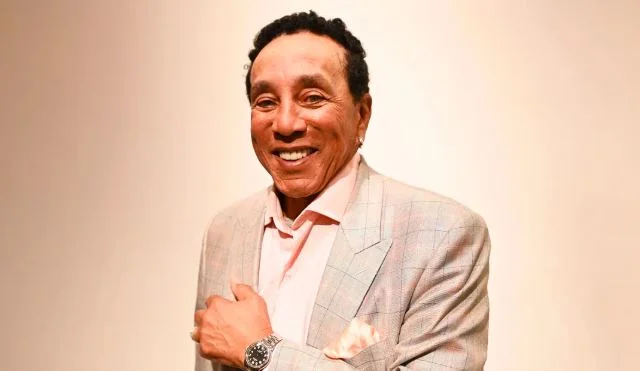
Smokey Robinson Ethnicity and Parents Nationality
William “Smokey” Robinson Jr. is a name synonymous with the rich history of American music. As a singer, songwriter, record producer, and former record executive, Smokey Robinson has left an indelible mark on the music industry. Born on February 19, 1940, in Detroit, Michigan, Smokey Robinson’s life and career are a testament to his passion, dedication, and innovative spirit. In this article, we will delve into Smokey Robinson’s ethnicity and explore his parents’ nationality, shedding light on the cultural heritage that has shaped this legendary artist.
Smokey Robinson Ethnicity and Cultural Background
| Category | Musicians |
|---|---|
| Full Name | William Smokey Robinson Jr. |
| Birthdate | February 19, 1940 |
| Birthplace | Detroit, Michigan, United States |
| Ethnicity | African American |
| Father Ethnicity | African American |
| Mother Ethnicity | African American |
Smokey Robinson’s ethnicity is African American. His ancestors hailed from West Africa, specifically from the regions of Ghana and Senegal, and were forcibly brought to the United States. They endured unimaginable hardships and challenges, including the brutal transatlantic journey and the injustices of systemic oppression and segregation. Despite these difficult beginnings, Smokey Robinson has proudly embraced his African American heritage throughout his life and career.
Smokey Robinson Family History
Smokey Robinson Embracing African American Culture
Smokey Robinson Artistic Style
Smokey Robinson Breaking Barriers and Paving the Way
Smokey Robinson Reflections
In various interviews and public appearances, Smokey Robinson has spoken proudly about his African American heritage and its impact on his life and career. He has emphasized the importance of understanding and respecting one’s cultural roots, and has encouraged others to do the same. Through his words and actions, Smokey Robinson has demonstrated a deep commitment to preserving and celebrating African American culture.
Smokey Robinson Siblings and Family Dynamics
Smokey Robinson grew up in a close-knit family with several siblings. His parents, William “Smokey” Robinson Sr. and Flossie Mae Robinson, had a total of six children, with Smokey being the second oldest. Growing up in a large family, Smokey Robinson learned valuable lessons about responsibility, teamwork, and communication.
Smokey Robinson Siblings Supportive Network
Smokey Robinson’s siblings played an important role in his life, providing a supportive network that encouraged his early interest in music. His siblings include:
Eddie Robinson: Smokey’s older brother, who was a significant influence on his early life and music career. Eddie worked as a songwriter and producer, penning several hits for Motown artists. He was also a talented musician, playing guitar and keyboards on many of Smokey’s recordings.
Geraldine Burston: Smokey’s younger sister, who was also involved in the music industry and worked as a backing vocalist for several Motown artists. Geraldine released her own solo album in the 1970s and toured extensively throughout the United States and Europe. She is married with two children and currently resides in Los Angeles.
Lillian Moss: Smokey’s younger sister, who was a talented singer and performed with several local music groups in Detroit. Lillian worked as a session singer, providing backing vocals for numerous Motown recordings. She is married with three children and currently resides in Detroit.
Bobby Robinson: Smokey’s younger brother actively contributed to the music industry as a songwriter and producer. Bobby co-wrote several hits with Smokey, including “My Girl” and “The Tears of a Clown.” He lives in Atlanta with his wife and two children.
Rose Ella Jones: Smokey’s younger sister, who was a talented singer and performed with several local music groups in Detroit. Rose worked as a music teacher, instructing students in voice and piano. She is married with two children and currently resides in Detroit.
Smokey Robinson Early Musical Influences
Growing up in a musical family, Smokey Robinson was exposed to a wide range of musical influences from an early age. In addition to this, his siblings were all involved in music in some way, and they would often sing and perform together as a family. Consequently, this early exposure to music not only helped shape Smokey Robinson’s unique sound and style but also laid the foundation for his future success as a musician. Moreover, the collaborative environment within his family played a significant role in nurturing his passion for music.
Smokey Robinson’s Relationship with His Siblings
Throughout his life and career, Smokey Robinson has maintained a close relationship with his siblings. In fact, despite the demands of his music career, he has always made time for his family and has been supportive of their various endeavors. Moreover, this commitment to family has been a constant source of strength and inspiration for Smokey, helping him to navigate the challenges of the music industry.
Similarly, the bond between Smokey Robinson and his siblings is a testament to the importance of family and the role it has played in his life and career. Additionally, this strong family bond has also been a source of comfort and support for Smokey, providing him with a sense of stability and continuity throughout his life. Ultimately, the close relationship between Smokey Robinson and his siblings serves as a shining example of the enduring power of family and the importance of maintaining strong relationships with loved ones. Furthermore, this commitment to family has been a hallmark of Smokey Robinson’s life and career, and continues to inspire and influence him to this day.
Smokey Robinson Professional Career
Smokey Robinson’s professional music career began in the late 1950s as the lead singer of the popular R&B group The Miracles. Formed in 1955, the group originally consisted of Smokey Robinson, Pete Moore, Ronnie White, Bobby Rogers, and Claudette Rogers. The Miracles were one of the first groups to sign with Berry Gordy’s Motown Records, and they played a significant role in establishing the label as a major force in the music industry.
Smokey Robinson Songwriting and Production
Smokey Robinson led The Miracles as the group’s singer, and he also established himself as a talented songwriter and producer. Robinson wrote the 1960 hit “Shop Around,” which The Miracles recorded and turned into Motown’s first number one single on the Billboard Hot 100 chart. He then followed up this success with a string of other hits, including “You’ve Really Got a Hold on Me,” “Mickey’s Monkey,” and “Ooo Baby Baby.”
Smokey Robinson Rise to Prominence
In the 1970s, Smokey Robinson launched a successful solo career, releasing his debut album “Smokey” in 1973. Consequently, this marked a significant turning point in his career, as he transitioned from being part of a group to becoming a solo artist. Notably, the album spawned the hit single “Sweet Harmony,” which showcased Smokey’s signature smooth and soulful vocals.
Furthermore, the album was followed by a string of other successful albums, including “Pure Smokey” (1974), “A Quiet Storm” (1975), and “Big Time” (1977). In addition, these albums solidified Smokey Robinson’s reputation as a masterful songwriter, producer, and performer. Ultimately, Smokey Robinson’s solo career cemented his status as one of the most talented and influential artists of his generation, leaving an indelible mark on the music industry. Moreover, his solo work continues to inspire and influence new generations of artists and music lovers alike.
Smokey Robinson Awards and Accolades
Throughout his career, Smokey Robinson has received numerous awards and accolades for his contributions to music. The Rock and Roll Hall of Fame inducted Smokey Robinson in 1987. He has won multiple Grammy Awards, including the Grammy Lifetime Achievement Award, which he received in 2006. Robinson has also received the National Medal of Arts, the Kennedy Center Honors, and a star on the Hollywood Walk of Fame.
Smokey Robinson Impact on the Music Industry
Smokey Robinson’s impact on the music industry cannot be overstated. Indeed, as a singer, songwriter, and producer, he has been instrumental in shaping the sound of popular music. Notably, his innovative blend of R&B, pop, and rock influences has influenced countless other artists, and his legacy continues to inspire new generations of musicians.
Smokey Robinson has left an indelible mark on the music industry with his contributions, and the industry will continue to celebrate his enduring legacy for years to come. In fact, many modern artists have been inspired by his music and legacy, and his influence can be seen in their work. Moreover, Smokey Robinson’s impact extends beyond the music industry, as his legacy has also had a profound impact on American culture and society. Ultimately, Smokey Robinson’s lasting impact on the music industry is a testament to his innovative spirit, creative genius, and enduring legacy.
Smokey Robinson Parents Nationality and Personal Life
Robinson’s parents, William “Smokey” Robinson Sr. and Flossie Mae Robinson, were both African Americans who took great pride in their heritage. Notably, his father was born in Little Rock, Arkansas, while his mother was born in Epps, Louisiana. In addition, both parents instilled in Smokey a strong sense of cultural identity and pride, which would later influence his music and artistic style. Moreover, the family instilled strong cultural values of family, education, and community in Smokey from a young age. As a result, these values played a significant role in shaping Smokey’s personality, character, and future success.
William Robinson Sr. worked as a truck driver and was an avid music lover, introducing Smokey to the sounds of Ray Charles, Sam Cooke, and other prominent African American artists of the time. Furthermore, Flossie Mae Robinson was a strong-willed and determined homemaker who played a pivotal role in shaping Smokey’s early life and musical aspirations. Similarly, the couple’s marriage was marked by a deep love and commitment to one another, and they instilled in Smokey the importance of hard work, dedication, and perseverance. Consequently, their influence had a lasting impact on Smokey’s life and career, shaping him into the talented and resilient artist he became. Ultimately, the values and principles instilled in Smokey by his parents have remained a constant source of inspiration and guidance throughout his life and career.
Conclusion
Smokey Robinson’s ethnicity and heritage are an integral part of his identity as an artist and a person. Notably, his African American roots have had a profound impact on his music, shaping his unique sound and style. Furthermore, from the early days of Motown to his current status as a music legend, Smokey Robinson’s African American heritage has been a constant source of inspiration and guidance. In addition, his music has not only reflected his own experiences and perspectives but has also given voice to the hopes, dreams, and struggles of African Americans throughout history.
As a result, as we celebrate Smokey Robinson’s remarkable life and career, we honor the rich cultural heritage that has made him a beloved and enduring figure in American music. Moreover, his legacy extends far beyond his own music, inspiring generations of artists, musicians, and music lovers around the world. Indeed, Smokey Robinson’s story is a testament to the power of music to bring people together, to transcend borders and boundaries, and to inspire positive change. In conclusion, his remarkable life and career highlight the enduring importance of African American culture and its profound impact on American music and society.



